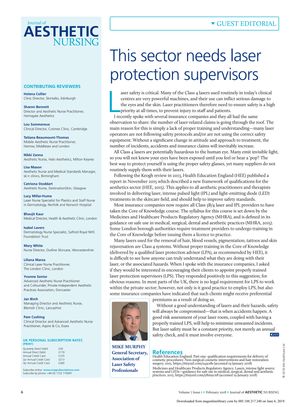The Importance of Laser Protection Supervisors in Clinical Settings
February 2018
in “
Journal of Aesthetic Nursing
”

TLDR Clinics using lasers should have trained laser safety supervisors to reduce accidents and possibly lower insurance costs.
The article emphasizes the importance of laser safety in clinical settings, highlighting the risks associated with Class 4 lasers which can cause serious damage to eyes and skin. It notes a rise in laser-related insurance claims due to inadequate training and non-compliance with safety protocols. The article references the Health Education England (HEE) report from November 2015, which outlines new qualification frameworks for aesthetic practitioners using laser and light treatments, aiming to improve safety standards. Insurance companies now require practitioners to complete a Core of Knowledge course, as per the Medicines and Healthcare Products Regulatory Agency (MHRA) guidelines. The article suggests that employing trained laser protection supervisors (LPS) is good practice and could lead to preferential insurance premiums, although it is not legally required in most parts of the UK. The author, Mike Murphy, stresses that understanding laser risks and having a trained LPS can minimize incidents, but laser safety must be a constant priority involving everyone.





